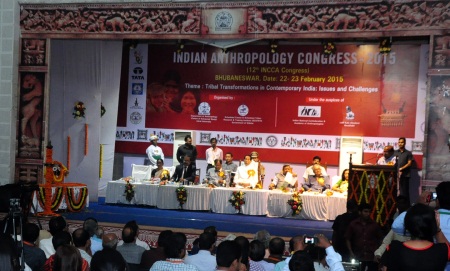Nature Talk
Indian Anthropology Congress 2015
Anthropology is changing its traditional tag as a subject confined to the study of tribal people, their customs, rituals and worldview, while romanticizing their innocence and remoteness. Recently held Indian Anthropology Congress 2015 in Bhubaneswar, Odisha and the topics deliberated upon in the Congress amply demonstrated the broad expanse of Anthropology. The Congress held under the auspices of The Indian National Confederation and Academy of Anthropologists (INCAA) and organized by the Department of Anthropology, Utkal University and Scheduled Caste and Scheduled Tribe Research and Training Institute (SCSTRTI), Government of Odisha could discuss as many as nineteen topical themes under the broad theme of ‘Tribal Transformations in Contemporary India: Issues and Challenges’, in only two days from 22nd February to 23rd February, speaks volumes for the organizational ability of personnel involved and their zeal to provide scholar participants to address the broad theme from different angles and perspectives. In this Congress one heard Anthropology with prefixes such as ‘Archeological’, ‘Bio-cultural’, ‘Molecular’ ‘Business’ besides hearing participants animatedly discussing on impact of globalization, development, displacement, morbidity, health, education and issues that the tribal communities face in contemporary India. The Congress was clear in its message that Anthropology is no more to merely celebrate the pristine nature of tribal communities but to understand their adaptation and anguish in the changing milieu affecting their life and livelihood. Yet through the theme ‘Intangible Cultural Heritage, Tribal Ethnography and Material Culture’ with emphasis on ‘Documentation, Conservation and Dissemination’ the concern is expressed for preserving the pristine past. Discussion on folk and rock art is another evidence in this direction. The traditional health care system and healing practices is another area, which had engaged scholars to delve deeper into such practices and explore their scientific basis. In such discussions the concerned was expressed about the extinction of medicinal plants caused due to deforestation and pollution. In this Congress, Anthropology appeared in its all-embracing posture, hardly missing any aspect that would not touch the tribal lives, past and present. While the Anthropological Survey of India held an exhibition on People of India before and during the Congress, the Lalit Kala Academi , New Delhi sponsored Tribal Art of Odisha inviting twenty tribal artists from different parts of Odisha to produce works of art for participants in the Congress to appreciate. Another attraction of this Congress was Pre-Congress Round Table discussion on an extremely important contemporary theme of ‘Society, State and Governance’, in which the distinguished panelists articulated their views with suggestions to overcome the difficulties each one offers. But the question, which was writ large on the face of audience, was: Would Anthropology stand the policy makers in good stead in formulating effective principles of governance, in creating a truly democratic and welfare State, and an egalitarian society?
-BKN




